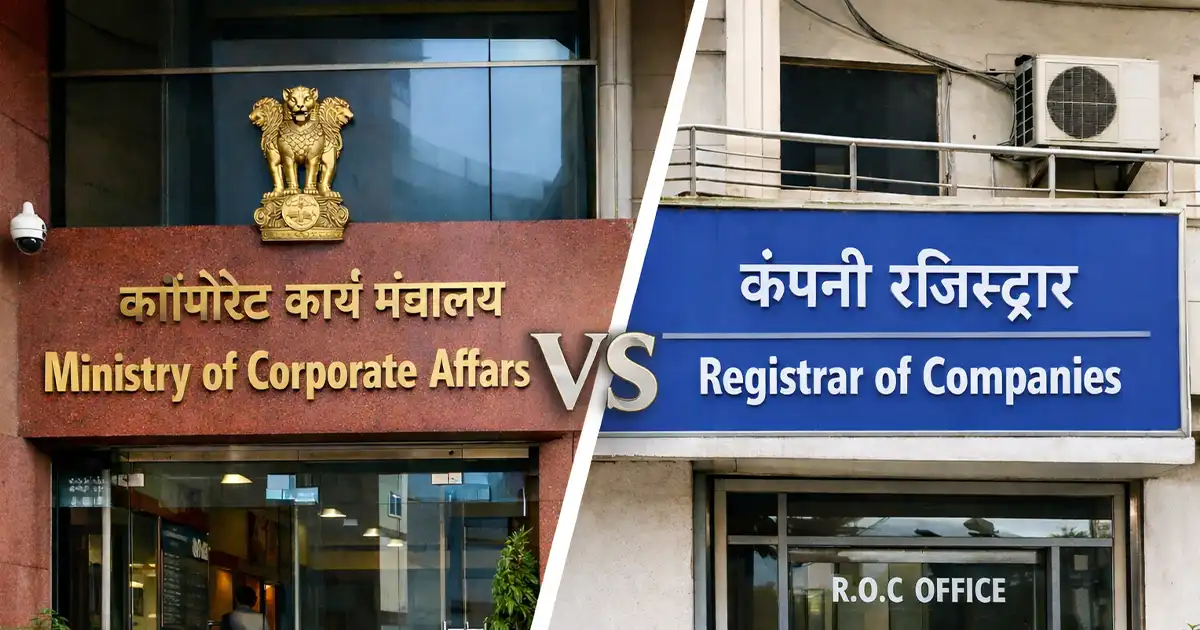
As of 2025, India has quickly risen to become the 3rd largest startup ecosystem in the world, with over 159,000 DPIIT-recognized startups and 100 unicorns. It is a great time to start a business in India, with a growing entrepreneurial landscape offering endless opportunities. However, choosing the right type of startup in India is crucial, as each has its own unique growth path, whether you’re aiming for rapid global expansion or a stable, locally focused business.
Are you drawn to scalable ventures that attract large investments, or are you more inclined towards building a stable, bootstrapped business? Recognizing these distinctions early helps you choose the right strategies, funding models, and business structure.
In this blog, we will guide you through the various types of startups in India, covering their growth models and funding sources. Whether you’re looking to apply for startup registration or need to understand legal compliance requirements for startups, this blog will help. Let’s explore the diverse startup ecosystem and find the best fit for your entrepreneurial journey.
What are the Core Types of Startups in India?
India’s startup ecosystem is diverse, offering various types of startups for entrepreneurs to explore. Each startup type has its own growth model, funding sources, and goals. The following are the key types of startups that entrepreneurs can choose from based on their business objectives.
1. Scalable Startups (The “Unicorn” Hunters)
Scalable startups focus on creating products that can expand quickly in terms of revenue, customer base, and market reach. These startups aim for rapid, massive growth, often using technology to drive that expansion. They are also known as “Unicorn” hunters because their goal is to achieve a $1 billion valuation, hence achieving the “unicorn” status.
To reach this level, they typically need significant investment from Venture Capitalists (VCs. In the early stages, they often operate at a loss to capture market share and scale.
- Key Areas: Tech, SaaS (Software as a Service), E-commerce, Fintech.
- Pros: High potential for massive financial returns and job creation.
- Cons: High risk of failure and loss of control to investors.
Example: Ola
Ola is a prime example of a scalable startup in India. Started as a ride-hailing platform and used technology to expand rapidly. It grew both domestically and internationally, attracting significant venture capital investment. The company continues to scale quickly, aiming to capture a large share of the global transportation market.
2. Small Business Startups
Small business startups are the backbone of India’s economy. These ventures aim for stable, local growth. They are often self-funded or rely on local loans (bootstrapping). Their goal is to generate consistent profits rather than seeking rapid, exponential growth.
- Key Areas: Local services like consulting, cloud kitchens, and repair shops.
- Pros: Lower financial risk, full control over the business, quicker path to profitability.
- Cons: Limited scalability and growth, highly dependent on local markets.
Example: Chai Point
Chai Point began as a small, homegrown tea brand with a single location and a simple business model. It focused on offering quality tea at convenient locations, primarily in office spaces. Over time, Chai Point expanded while maintaining a focus on local markets and steady, sustainable growth.
3. Lifestyle Startups
Founders drive lifestyle startups with their passion. These businesses focus on maintaining a healthy work-life balance and doing what the founder enjoys. They often monetize personal skills or hobbies. These startups usually remain small and often fail to scale much beyond the founder’s capabilities.
- Key Areas: Freelance services, coaching, travel blogs, artisanal crafts.
- Pros: Personal fulfillment, flexibility, and low overhead costs.
- Cons: Limited growth and difficult to scale without additional help.
Example: The Urban Monk
A lifestyle startup that offers wellness coaching, yoga, and mindfulness services. Founded by a passionate wellness enthusiast, it focuses on work-life balance and personal fulfillment for both the founder and clients. While it remains small, it thrives by monetizing a personal passion.
4. Buyable Startups (Built-for-Acquisition)
Founders build buyable startups with one goal: sell the business to a larger company within 3–5 years. These startups focus on developing unique technologies or processes that a larger company would want to acquire rather than build from scratch. Buyable startups in the technology and software industry are designed to be sold to larger companies later.
- Key Areas: Technology, app development, fintech.
- Pros: Quick exit strategy and a high payout for founders.
- Cons: Success depends on finding a willing buyer, and pressure to stay relevant.
Example: FreeCharge
FreeCharge, a digital payments startup, launched in 2010 and quickly scaled in the Indian market. In 2015, Snapdeal acquired FreeCharge for approximately $400 million, just five years after its launch. Snapdeal saw the platform’s rapid growth as an opportunity to enhance its e-commerce services. The founders benefited from the quick acquisition, cashing out while Snapdeal integrated FreeCharge into its business model.
5. Big Company Startups (Corporate Ventures)
Large corporations often create “intra-preneurial” units or departments to explore new business models or products without disrupting their core operations. These ventures operate with the agility of a startup but are backed by the resources and brand power of the parent company.
- Key Areas: Telecom, digital services, super apps.
- Pros: Guaranteed funding, access to large customer bases, and resources.
- Cons: Corporate bureaucracy, slow decision-making, and cultural conflicts.
Example: Jio Platforms
Jio, launched by Reliance Industries, started as a startup within the corporate giant, offering disruptive services in telecommunications and digital content. Despite being backed by a massive parent company, Jio operates with the agility of a startup and continues to innovate with new products and services.
6. Social/Impact-Driven Startups
These startups focus on solving social or environmental problems while also generating profit. They aim to create a positive societal impact through their business model, whether it’s tackling poverty, improving education, or addressing climate change. Their “profit” often includes a measurable Social Return On Investment (SROI).
- Key Areas: Edtech, cleantech, healthtech, and rural development.
- Pros: Positive societal value, mission-driven employees, and long-term impact.
- Cons: Balancing financial and social returns can be difficult, and securing traditional VC funding can be challenging.
Example: Pollinate Group
Pollinate is a social enterprise that empowers women entrepreneurs in India by providing them with the resources to distribute affordable health and hygiene products in underserved communities. Their business model combines social impact with profit generation, creating a measurable social return on investment.
Which Startup Type Fits You?
Choosing the right startup type in India depends on your goals, lifestyle, and the kind of impact you want to make.
- Want fast growth? → Choose a scalable startup, aiming for rapid market expansion and the potential to become a unicorn.
- Want freedom? → Opt for a lifestyle startup, where you can monetize your personal skills or passions while maintaining a healthy work-life balance.
- Want to sell your company? → Go for a buyable startup, designed for quick acquisition by a larger company.
- Want social impact? → Focus on an impact startup, prioritizing societal benefit alongside business growth.
- Want stable income? → Consider a small business, offering steady returns with lower risk and a focus on local markets.
Pick the right path, validate your idea, and build with clarity. Whether you’re exploring different types of startups or narrowing down your focus, choosing the right startup type in India is the first step towards turning your entrepreneurial vision into reality.
Startup vs. Traditional Small Business
We often hear the terms ‘startup’ and ‘small business’ interchangeably, but they represent fundamentally different types of businesses for startup ventures, especially in India.
What is a “Startup” in the Indian Context?
A startup in India is an entity, usually incorporate as a Private Limited Company or LLP, focused on developing and validating a unique, innovative, and scalable product, service, or business model.
The Department for Promotion of Industry and Internal Trade (DPIIT) Registration formally recognizes a company as a startup. To qualify, it must meet specific criteria related to age, turnover, innovation, and potential for wealth creation.
Startups vs. Traditional Small Businesses
The core difference between a startup and a traditional small business lies in the intent and growth model.
| Feature | Startup | Traditional Small Business |
| Growth Goal | Aims for rapid, exponential growth and large-scale market disruption. Scalability is the main objective. | Aims for stable, predictable, and gradual growth, focusing on long-term sustainability and profitability within a local or niche market. |
| Innovation | High emphasis on innovation, often introducing a new product, technology, or types of business models for startups. | Follows established, proven business models and offers existing products/services. |
| Funding Source | Primarily seeks external capital: Angel Investors, Venture Capital (VC), and specialized types of startup funding. | Relies mainly on personal savings (Bootstrapping), bank loans, or reinvested profits. |
| Risk Profile | High-risk, high-reward environment; a frequent focus on scale over early profit. | Lower risk profile; focuses on generating revenue and profit from day one. |
| Example | Zomato, Razorpay, Zepto (Quick Commerce) | Your local kirana store, an established neighbourhood salon, or a small factory unit. |
Founders must know which path they choose, as it determines their product-market fit, capital needs, operational structure, and legal compliance requirements for startups. Legal aspects like DPIIT registration, GST compliance, and intellectual property protection are essential to stay compliant. Investors assess risk and potential return based on these factors, helping them select the most suitable startups for their portfolio.
How to Choose the Right Type of Startup for Indian Entrepreneurs?
Choosing the right type of startup can be a challenging decision. The type of business you should start depends on your resources, goals, and market opportunities. Here’s a simple guide to help you make the right choice:
1. Assess Your Resources and Risk Appetite
Before deciding on the right startup type in India, evaluate the resources you have and the level of risk you’re willing to take on.
- Capital & Funding: If you have limited funds and plan to use your own savings, consider starting a Small Business Startup or a Lifestyle Startup. These types of businesses usually grow slowly and steadily. However, if you have a breakthrough idea and need large amounts of capital to scale, you will need to attract different types of startup funding, like Venture Capital.
- Skills & Network: Think about your team’s strengths. If you have a technical team, a SaaS (Software as a Service) startup could be a good fit. If you have strong logistics and operations experience, a Quick Commerce startup (like Zepto) might be a better fit. Your team’s skills will determine which types of startups are best suited for your venture.
2. Analyze Market Demand in India
Focus on the real problems that need solving. India’s massive population of over 1.4 billion people offers countless opportunities. For example, there’s a huge demand for Fintech, E-commerce, Edtech, and Healthtech solutions. Look at government investments, like the IndiaAI Mission, which supports deep-tech and AI startups. These sectors are attracting investor interest and funding, making them good areas to explore.
3. Consider Your Goals: Growth vs. Stability vs. Impact
Your goals will shape your business choice. Ask yourself:
- Growth: If you want to build a high-growth startup and take a big exit (such as an IPO), you’ll likely need to create a Scalable Startup.
- Stability: If you value financial stability and prefer a steady income, Small Business Startups are a better option. These types of startups grow at a slower pace but offer more control and less risk.
- Impact: If you want to create a business that has a social impact, look into Social/Impact-Driven Startups. Social/Impact-driven startups solve social or environmental problems while also making a profit.
4. Regulatory and Compliance Considerations
You must understand India’s legal requirements before starting your business. Types of startup firms in areas like Fintech, Healthtech, or Agri-tech must meet specific regulatory standards. For example, if you plan to start a food business, you’ll need FSSAI Registration.
Similarly, Fintech startups may need SEBI registration, and all companies in India must register for GST. If you’re unsure about compliance, startup incubators and accelerators can provide valuable guidance to navigate these complex regulations.
Actionable Steps for Aspiring Entrepreneurs to Launch a Successful Startup
Starting any type of startup business in India requires a clear plan, focus, and persistence. Here are the essential steps to get started:
1. Validate Your Idea: Before you invest time and money, ensure your idea solves a real problem. Talk to at least 50 potential customers to understand their needs. Make sure your solution addresses a genuine pain point that people are willing to pay for.
2. Conduct Market Research: Define the Total Addressable Market (TAM) for your product or service. Is your target audience local, pan-India, or global? This will help you decide which types of business models for startups will work best for your market.
3. Build a Minimum Viable Product (MVP): Create the simplest version of your product that provides core value to your customers. Launch it quickly, gather feedback, and improve your product based on real user experiences.
4. Create a Business Plan: Clearly outline your revenue model in your business plan along with operational strategy, and initial capital requirements. This plan is crucial, especially if you’re seeking different types of startup funding to grow your business.
5. Ensure Compliance and Register Your Startup: To operate legally, your startup must comply with Indian regulations.
- DPIIT Recognition: Register under the Startup India entity to access tax benefits and government support schemes.
- GST Registration: Most businesses must register for GST to legally operate and manage taxes.
- MSME Registration (Udyam): If you’re running a small business startup, register for MSME to unlock government benefits.
- Industry-Specific Licenses: Depending on your sector, you may need licenses like FSSAI for food businesses and ISO Certification for quality management.
By following these actionable steps, you will ensure long-term success. Contact us today to get expert guidance and support throughout your startup journey, from idea validation to regulatory compliance.
Frequently Asked Questions
India has several types of startups, including:
- Scalable Startups: These aim for rapid global growth.
- Small Business Startups: These focus on local markets.
- Lifestyle Startups: These are driven by the founder’s passion.
- Buyable Startups: These are built with the intention of being acquired.
- Big Company Startups: These are corporate ventures, backed by large companies.
- Social/Impact-Driven Startups: These solve societal problems while also generating profit.




